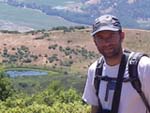Kevin B. Lunde

Background
I received my B.S. degree in Biology from the University of California San Diego. Subsequently, I began working on the emerging problem of amphibian limb malformations. In collaboration with multiple universities and government agencies, we demonstrated that a trematode parasite (Ribeiroia ondatrae) was the major cause of limb malformations in the western United States. We documented a significant association between the presence and abundance of this parasite and limb malformation in nine species of amphibians. This field work was supported by controlled laboratory studies involving two species of anurans in which Ribeiroia induced limb malformations similar in type and frequency to those observed in the wild. In fall 2005, I enrolled in the ESPM graduate program.
Research Interests
My interest in aquatic ecology has grown to encompass community dynamics in both lotic and lentic systems. I am interested in land use effects on aquatic environments, disease ecology, wildlife conservation, and restoration ecology.
Quantifying impacts of urbanization
I am conducting an analysis investigating the effects of urbanization in the San Francisco Bay Area on watershed integrity using a macroinvertebrate dataset. Macroinvertebrate communities are responsive to multiple types of aquatic stressors, and thus can be used as an excellent bioassessment tool. We observed significant declines in macroinvertebrate diversity and loss of sensitive taxa with increasing percent of urbanization in the watershed. While this trend has been observed previously, the current modeling approach in this study can highlight where other impacts are at play by removing the modeled signal of urbanization and looking at the adjusted residuals. Such an analysis can help managers identify and prioritize reaches or streams in need of restoration and estimate their percent of recovery. I plan to look at developing a multimetric index often called an index of biotic integrity (IBI) to describe aquatic conditions in the Bay Area.
Conservation value of stormwater ponds
Urban runoff is a form of nonpoint source pollution degrading urban creeks and streams as well as coastal wetlands. Stormwater best management practices (BMPs) can help reduce the peak flows, sediments, and nutrient inputs contributed by runoff. One type of BMP is a wet basin (wet pond/wetland), which is designed to hold water for long periods of time. These systems also provide direct aquatic habitat, supporting aquatic invertebrates, amphibians, and birds. However, few studies have examined exactly what animals are present, and what structural, hydrological, or landscape parameters influence species diversity and abundance. Therefore, I plan to survey approximately 30 stormwater wet basins in the San Francisco Bay Area to determine the environmental factors are related to diversity and abundance of macroinvertebrate and amphibian species. This information can be useful to stormwater engineers or managers who may wish to use these systems for dual purposes (stormwater and wetland conservation) or conversely, to limit the use of these sites by wildlife (e.g., by freeways or airports).
Amphibian malformations
Many questions remain in the field of amphibian malformations. While Ribeiroia has explained the presence and abundance of limb malformations in nine amphibian species across the western United States, there is little known about what ecosystem drivers promote the presence or abundance of this parasite. I will remove the aquatic snail hosts from one half of a pond that has historically supported populations of Pacific treefrogs (Pseudacris regilla) with high frequencies of limb malformations (>50%) to demonstrate that Ribeiroia is the cause of mass malformations at that site. Simultaneously, I will monitor the response of the macroinvertebrate community structure and periphyton response to investigate the effect of resource mediated competition on population dynamics. These studies will involve long-term monitoring of a number of other control sites that will enable me to study causes of inter-annual variation in peak malformation frequencies.
Please see my Curriculum Vitae to read more about my previous work
Contact
Information
Kevin Lunde
Department of Environmental Science, Policy, & Management
University of California, Berkeley
137 Mulford Hall #3114, Resh Lab
Berkeley, CA 94720
Phone: 510.642.6315
Fax: 510.642.7428
klunde@nature.berkeley.edu

